History and profile
The magazine was founded by G. B. Barletta and started its publications with the name Facciamo gli Italiani ("Let's do the Italians"), changing its name in Lo Scolaro in 1915. [2] It came out weekly during the school year, and fortnightly/monthly during the summer. It was distributed on newsstands and in over three thousand schools. [2] The magazine alternated topical headings and curiosity columns, short stories and serials, games, articles on school or teaching topics and comics. [2] Some important Italian cartoonists collaborated to the magazine, including Luciano Bottaro (who here introduced the Pon Pon character), Franco Aloisi, Giovan Battista Carpi, Giulio Chierchini, Paolo Piffarerio, Gallieno Ferri, Guido Zamperoni. [2] In addition to humorous and adventurous comics, in deference to the educational function of the magazine, there were published numerous comics which adapted famous novels, biographies and historical events. [2]
Given to a sales crisis, in January 1970 the magazine changed name to Lo Scolaro D'Europa ("The Schoolboy of Europe") and started mainly publishing previously published material, but the new course was short lived and the magazine finally closed in May 1972 after a sixty-year history and more than 1,000 issues published. [2]
Giovan Battista Carpi was a prolific Italian comics artist, illustrator, and teacher from Genoa.
Luciano Bottaro was an Italian comic book artist.
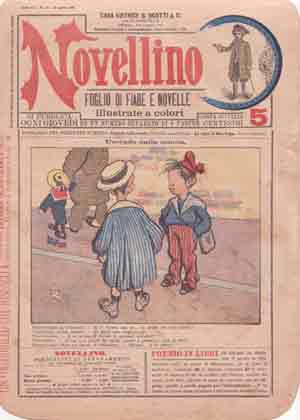
Italian comics, also known as fumetto, plural form fumetti, are comics that originate in Italy. The most popular Italian comics have been translated into many languages. The term fumetto refers to the distinctive word balloons that contain the dialogue in comics.
Notable events of 1955 in comics.
Dutch comics are comics made in the Netherlands. In Dutch the most common designation for the whole art form is "strip", whereas the word "comic" is used for the (usually) soft cover American style comic book format and its derivatives, typically containing translated US superhero material. This use in colloquial Dutch of the adopted English word for that format can cause confusion in English language texts.

Raoul Cauvin was a Belgian comics author and one of the most popular in the humorist field.

Kalle Anka & C:o is a Swedish weekly Disney comics magazine, published by Egmont. The 52-page comic, launched in September 1948, is the overall best-selling Swedish comic magazine. In the early years, the comic printed translated stories from the United States, including Walt Disney's Comics and Stories, Four Color and other Dell Comics Disney titles. As Disney comics production waned in the United States in the 1960s, Kalle Anka began printing more European-produced content, from Scandinavia and Italy. Now, Kalle Anka & C:o and its Scandinavian sister editions Anders And & Co. (Denmark) and Donald Duck & Co (Norway) are identical, apart from the language.
The Corriere dei Piccoli, later nicknamed Corrierino, was a weekly magazine for children published in Italy from 1908 to 1995. It was the first Italian periodical to make a regular feature of publishing comic strips.
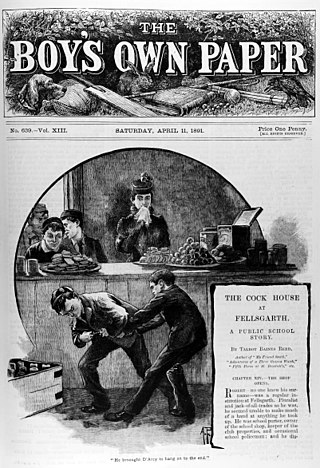
Magazines intended for boys fall into one of three classifications. These are comics which tell the story by means of strip cartoons; story papers which have several short stories; and pulp magazines which have a single, but complete, novella in them. The latter were not for the younger child and were often detective or western in content and were generally greater in cost. Several titles were published monthly whereas the other two categories were more frequent.

Western comics is a comics genre usually depicting the American Old West frontier and typically set during the late nineteenth century. The term is generally associated with an American comic books genre published from the late 1940s through the 1950s. Western comics of the period typically featured dramatic scripts about cowboys, gunfighters, lawmen, bounty hunters, outlaws, and Native Americans. Accompanying artwork depicted a rural America populated with such iconic images as guns, cowboy hats, vests, horses, saloons, ranches, and deserts, contemporaneous with the setting.
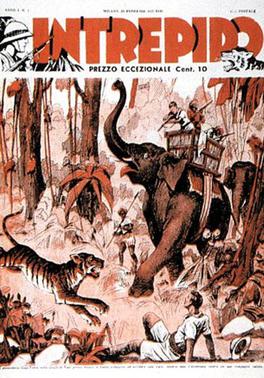
Intrepido, also referred to as L'Intrepido, was a weekly comic magazine published by Casa Editrice Moderna between 1935 and 1998.
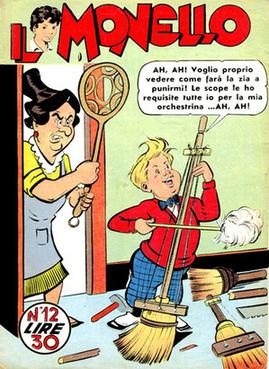
Il Monello was a weekly comic magazine for kids and teens published in Italy from 1933 to 1990.
The Giornale dei Ragazzi was a fortnightly magazine for children consisting of short stories, comics and cultural columns.

Pon Pon is the title character of an Italian comic strip created by Luciano Bottaro.

L'Audace was a weekly children and comic magazine published in Italy from 1934 to 1944.

Re di Picche is the title character of an Italian comic series created by Luciano Bottaro.

Skorpio is a weekly anthology comic magazine published in Argentina from 1974 to 1996 and in Italy from 1977 onward.

Andrea Lavezzolo was an Italian novelist and short story writer who created and wrote many prominent Italian comics of the 1940s and 1950s.

Il Piccolo Sceriffo was an Italian comic book series created by writer Tristano Torelli with illustrator Camillo Zuffi and later developed by numerous authors. It originally ran from 1948 until 1966.
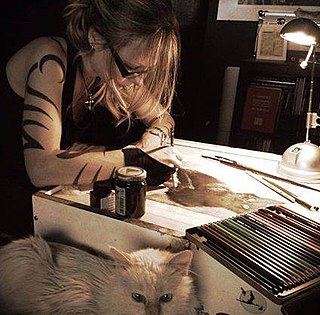
Elena de' Grimani, also known as Ombra, is an Italian comics artist and illustrator, author of the character Rigel.
This page is based on this
Wikipedia article Text is available under the
CC BY-SA 4.0 license; additional terms may apply.
Images, videos and audio are available under their respective licenses.














